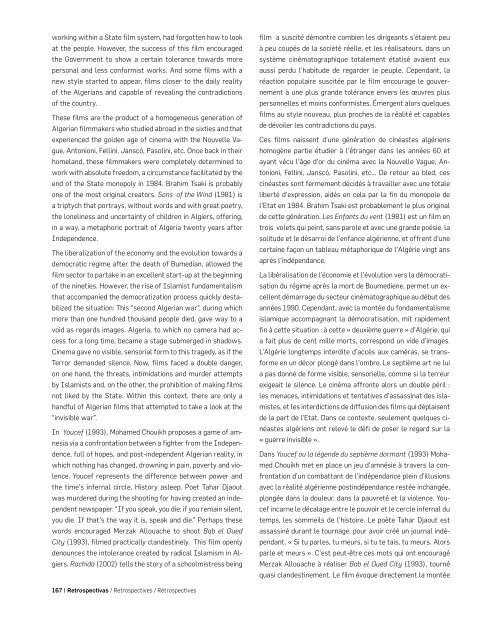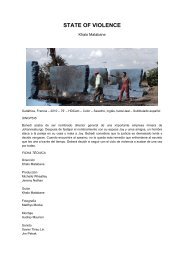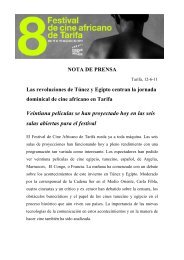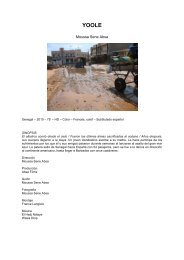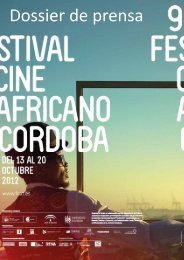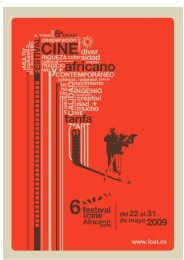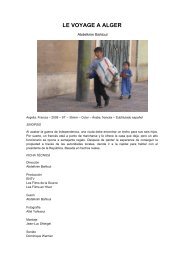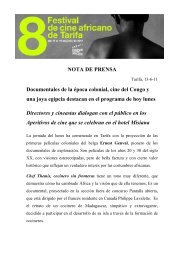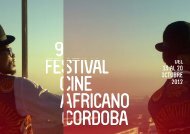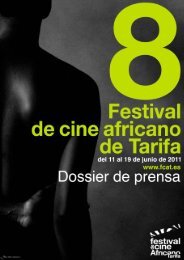Catálogo - FCAT
Catálogo - FCAT
Catálogo - FCAT
You also want an ePaper? Increase the reach of your titles
YUMPU automatically turns print PDFs into web optimized ePapers that Google loves.
working within a State film system, had forgotten how to look<br />
at the people. However, the success of this film encouraged<br />
the Government to show a certain tolerance towards more<br />
personal and less conformist works. And some films with a<br />
new style started to appear, films closer to the daily reality<br />
of the Algerians and capable of revealing the contradictions<br />
of the country.<br />
These films are the product of a homogeneous generation of<br />
Algerian filmmakers who studied abroad in the sixties and that<br />
experienced the golden age of cinema with the Nouvelle Vague,<br />
Antonioni, Fellini, Janscó, Pasolini, etc. Once back in their<br />
homeland, these filmmakers were completely determined to<br />
work with absolute freedom, a circumstance facilitated by the<br />
end of the State monopoly in 1984. Brahim Tsaki is probably<br />
one of the most original creators. Sons of the Wind (1981) is<br />
a triptych that portrays, without words and with great poetry,<br />
the loneliness and uncertainty of children in Algiers, offering,<br />
in a way, a metaphoric portrait of Algeria twenty years after<br />
Independence.<br />
The liberalization of the economy and the evolution towards a<br />
democratic regime after the death of Bumedian, allowed the<br />
film sector to partake in an excellent start-up at the beginning<br />
of the nineties. However, the rise of Islamist fundamentalism<br />
that accompanied the democratization process quickly destabilized<br />
the situation: This “second Algerian war”, during which<br />
more than one hundred thousand people died, gave way to a<br />
void as regards images. Algeria, to which no camera had access<br />
for a long time, became a stage submerged in shadows.<br />
Cinema gave no visible, sensorial form to this tragedy, as if the<br />
Terror demanded silence. Now, films faced a double danger,<br />
on one hand, the threats, intimidations and murder attempts<br />
by Islamists and, on the other, the prohibition of making films<br />
not liked by the State. Within this context, there are only a<br />
handful of Algerian films that attempted to take a look at the<br />
“invisible war”.<br />
In Youcef (1993), Mohamed Chouikh proposes a game of amnesia<br />
via a confrontation between a fighter from the Independence,<br />
full of hopes, and post-independent Algerian reality, in<br />
which nothing has changed, drowning in pain, poverty and violence.<br />
Youcef represents the difference between power and<br />
the time’s infernal circle, History asleep. Poet Tahar Djaout<br />
was murdered during the shooting for having created an independent<br />
newspaper. “If you speak, you die; if you remain silent,<br />
you die. If that’s the way it is, speak and die.” Perhaps these<br />
words encouraged Merzak Allouache to shoot Bab el Oued<br />
City (1993), filmed practically clandestinely. This film openly<br />
denounces the intolerance created by radical Islamism in Algiers.<br />
Rachida (2002) tells the story of a schoolmistress being<br />
film a suscité démontre combien les dirigeants s’étaient peu<br />
à peu coupés de la société réelle, et les réalisateurs, dans un<br />
système cinématographique totalement étatisé avaient eux<br />
aussi perdu l’habitude de regarder le peuple. Cependant, la<br />
réaction populaire suscitée par le film encourage le gouvernement<br />
à une plus grande tolérance envers les œuvres plus<br />
personnelles et moins conformistes. Émergent alors quelques<br />
films au style nouveau, plus proches de la réalité et capables<br />
de dévoiler les contradictions du pays.<br />
Ces films naissent d’une génération de cinéastes algériens<br />
homogène partie étudier à l’étranger dans les années 60 et<br />
ayant vécu l’âge d’or du cinéma avec la Nouvelle Vague, Antonioni,<br />
Fellini, Janscó, Pasolini, etc… De retour au bled, ces<br />
cinéastes sont fermement décidés à travailler avec une totale<br />
liberté d’expression, aidés en cela par la fin du monopole de<br />
l’Etat en 1984. Brahim Tsaki est probablement le plus original<br />
de cette génération. Les Enfants du vent (1981) est un film en<br />
trois volets qui peint, sans parole et avec une grande poésie, la<br />
solitude et le désarroi de l’enfance algérienne, et offrent d’une<br />
certaine façon un tableau métaphorique de l’Algérie vingt ans<br />
après l’indépendance.<br />
La libéralisation de l’économie et l’évolution vers la démocratisation<br />
du régime après la mort de Boumediene, permet un excellent<br />
démarrage du secteur cinématographique au début des<br />
années 1990. Cependant, avec la montée du fondamentalisme<br />
islamique accompagnant la démocratisation, mit rapidement<br />
fin à cette situation : à cette « deuxième guerre » d’Algérie, qui<br />
a fait plus de cent mille morts, correspond un vide d’images.<br />
L’Algérie longtemps interdite d’accès aux caméras, se transforme<br />
en un décor plongé dans l’ombre. Le septième art ne lui<br />
a pas donné de forme visible, sensorielle, comme si la terreur<br />
exigeait le silence. Le cinéma affronte alors un double péril :<br />
les menaces, intimidations et tentatives d’assassinat des islamistes,<br />
et les interdictions de diffusion des films qui déplaisent<br />
de la part de l’Etat. Dans ce contexte, seulement quelques cinéastes<br />
algériens ont relevé le défi de poser le regard sur la<br />
« guerre invisible ».<br />
Dans Youcef ou la légende du septième dormant (1993) Mohamed<br />
Chouikh met en place un jeu d’amnésie à travers la confrontation<br />
d’un combattant de l’indépendance plein d’illusions<br />
avec la réalité algérienne postindépendance restée inchangée,<br />
plongée dans la douleur, dans la pauvreté et la violence. Youcef<br />
incarne le décalage entre le pouvoir et le cercle infernal du<br />
temps, les sommeils de l’histoire. Le poète Tahar Djaout est<br />
assassiné durant le tournage, pour avoir créé un journal indépendant.<br />
« Si tu parles, tu meurs, si tu te tais, tu meurs. Alors<br />
parle et meurs ». C’est peut-être ces mots qui ont encouragé<br />
Merzak Allouache à réaliser Bab el Oued City (1993), tourné<br />
quasi clandestinement. Le film évoque directement la montée<br />
167 | Retrospectivas / Retrospectives / Rétrospectives


